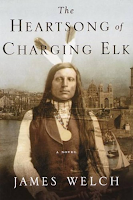A man wakes up in a sick ward in Marseille. He doesn't understand where he is, and no one can tell him, because he doesn't speak their language. He is Charging Elk, a young Lakota man who has traveled to Europe with Buffalo Bill and the famous Wild West Show, pretending to hunt buffalo--and Custer--for admiring audiences. But he takes ill, the Wild West Show leaves Charging Elk behind, and through a series of legal mishaps and a great deal of mutual misunderstanding, it seems no one can figure out how to get him back to America, or even Rome, where Buffalo Bill is. It's the beginning of a long exile for Charging Elk, who will spend at least the next sixteen years of his life in France.
The Heartsong of Charging Elk reminded me a great deal of Caroline Dodds Pennock's book On Savage Shores, which I read last year, and which is about the experiences of Indigenous people from the Americas visiting Europe. In a way, it turns colonial narratives on their head: here, it is Marseille that is the strange and exotic place and the Indigenous man the traveler. But no, not quite, because the prejudice that Charging Elk experiences in Marseille is colonial to its core; even those who seek to help him are convinced that he is a "savage" who will never be able to adjust to civilized European life. And they are right insofar as life in Europe is bewildering for Charging Elk, one to which he has much trouble adjusting, especially because he knows no French (and of course there is no one in France who speaks Lakota). He ends up in the home of a kindly fishmonger, who adopts him as a kind of second son, and little by little Charging Elk finds himself adopting French ways--chiefly, drinking wine.
When he arrives in Europe, Charging Elk is young, and has little experience with women, even back home in America. As many of the Lakota in the Wild West Show, he has a profound interest in European women. Out of both deep lust and deep loneliness, he begins patronizing a prostitute named Marie, even falling in love with her, but she is blackmailed by an unscrupulous restaurateur into drugging Charging Elk so that he might rape him. During the act, Charging Elk wakes up and stabs the man to death. At his trial, he struggles to explain himself: though a sympathetic jury looks to him to explain the mitigating circumstances, he is only able to say that he killed a siyoko, an evilness, as any Lakota might have done. This, of course, is taken as more proof of savagery, of an incompatibility with the civilized world. Ironically, Charging Elk becomes a cause celebre in the papers; most of the French seem to believe that he has been unfairly charged, and yet this is only enough to save him from the guillotine, not a sentence of life imprisonment. The French may sympathize with him, or pity him, but there is no one who truly understands him.
Welch passes over the many years that Charging Elk spends in prison with relative swiftness. Eventually, he's released on a grimly ironic technicality--something about him not being an American citizen and thus not able to be tried. (I forget.) Life improves for him after prison: he is placed with a farmer, and eventually falls in love with the farmer's daughter, and marries her. It is a bittersweet development; Charging Elk finds love at last, and someone in this immense and frightening continent who understands him, but he knows all too well that to marry a French woman means to give up the dream of return. It means to become, irrevocably, French--to live between two worlds. The novel treats this with a touching ambiguity, which suggest perhaps that there is much to be gained by becoming "civilized," though much, too, is lost. The novel's most affecting moment comes at the end, when the Wild West Show returns after sixteen years and Charging Elk finds himself among a new generation of Lakota. The story they tell is a horrible one, of boarding schools and forced assimilation, of the desperation of the Ghost Dance and the death of both Charging Elk's father and the great Sitting Bull. The bitter irony is that the home Charging Elk left is rapidly being Europeanized, and that there's no guarantee that, had he stayed in the Badlands, he might not have been forced to cut his hair and adapt to European ways anyhow. Here, in Marseille, at least, he has his wife and child-to-be waiting.


No comments:
Post a Comment